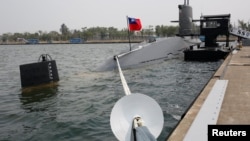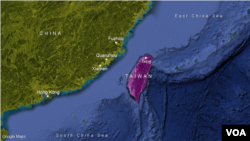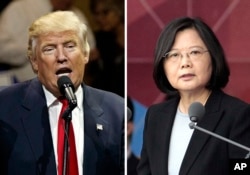Taiwan is pursuing a two-pronged upgrade to its armed forces as people on the island worry about recent shows of force by powerful rival China during a political stalemate.
Last week, the Taiwanese navy signed a memorandum of understanding with two local companies to develop submarines over the next four years. Construction of the vehicles, ideal for warfare against a stronger adversary, could reach $85.8 million, though the final price is not set, the defense ministry spokesman said.
Taiwan’s ambition to design its own submarines stems partly from China’s pressure against other governments to avoid selling the island any arms.
Last week the Taiwan president called the submarine project “the most challenging aspect” of a broader plan to foster an independent local defense industry, per a local media report.
Taiwan now operates two Dutch-designed Hai Lung submarines, bought in the early 1980s, and two Guppy II-class submarines dating back to 1946. China has the world’s third most powerful armed forces overall, with Taiwan in 19th place, according to the GlobalFirePower.com database.
The navy has not fixed on a number of submarines to develop as part of the agreement signed Tuesday, the defense ministry spokesman said.
“Because in the past, Taiwan has the technology to build boats, we hope to make use of this domestic industry,” said senior Taiwan legislator Lee Chun-yi. “We hope we can use the construction (of submarines) to encourage domestic industries, and there’s a definite help for Taiwan’s defense sector.”
Taiwan looks to the US
Separately, U.S. President Donald Trump may approve a sale of advanced weapons to Taiwan in the first half of the year according to media reports from Washington.
“Without speaking to any specific cases, we can say that under long-standing U.S. policy, U.S. arms sales to Taiwan are ... based on an assessment of Taiwan’s defense needs,” said Sonia Urbom, spokesperson for The American Institute in Taiwan (AIT), which unofficially represents U.S. interests in Taipei.
“Defensive arms are helpful for Taiwan’s security,” Lee said. “We hope for them and welcome them. We also all hope the United States can have a closer military dialogue and that the United States will approve this package as soon as possible and let Taiwan process it as soon as possible.”
Taiwan defense ministry spokesman Chen Chung-chi said Monday the government would urge Washington to make the arms sale.
December arms deal blocked
The administration of former U.S. President Barack Obama stopped an arms sale to Taiwan in December. Some analysts expect Trump at least to unblock it. The United States may sell advanced rocket systems and anti-ship missiles to Taiwan in the next package, news reports from Washington say.
“I wouldn’t necessarily characterize it as urgency,” said Ross Feingold, Taipei-based analyst with an American political consultancy. “The time has come to make a decision and the Obama Administration decided to punt, and now the Trump Administration is following up in a reasonable and appropriate time frame.
“A better question would be what’s going to come next because we are simply approving things that were on the table and under discussion already,” he said.
Chinese officials fume when other countries, especially the United States, sell weapons to Taiwan. Taiwan is looking to Trump because he risked China’s anger by speaking to Tsai by phone in December and his staff has taken a tough line against Beijing’s military expansion at sea.
China temporarily cut off some exchanges with the United States in 2010 when Obama approved a $6.4 billion arms package for Taiwan. After Washington announced a $1.83 billion package in 2015, China formally protested to the U.S. Embassy in Beijing.
Some see Obama’s decision to stop an arms deal in December as a goodwill gesture toward China, and say approval by Trump would risk China calling off any cooperation with the United States on containing North Korea.
Shaken by aircraft cruise
People in Taiwan have been particularly on guard since the Liaoning aircraft carrier, the only ship of its type in the Chinese navy, sailed around Taiwan in December and January. Taiwan is just 160 kilometers away from China at its nearest point.
This month China flew 13 aircraft east of Taiwan, near Okinawa. Taiwan’s defense ministry is also watching as Beijing builds military infrastructure in the disputed South China Sea.
“China is doing some activities in the South China Sea recently, and even though they’re not always directed toward Taiwan, in the Pacific region it’s stronger and stronger, so people in Taiwan feel that without the ability to resist we will be diminished in terms of bargaining position,” said Ku Chung-hua, a standing board member in the Taipei-based political action group Citizens’ Congress Watch.
Taiwan frets because the Communist leadership claims sovereignty over the self-ruled island despite opinion polls showing most Taiwanese oppose China’s goal of eventual unification. The two sides talked regularly from 2008 to 2015 but stopped after Taiwan President Tsai Ing-wen took office last year.
Tsai takes a more guarded view of relations with China than her predecessor and Beijing is seen using military displays as well as diplomatic and economic measures to pressure Taiwan back into talks. China has not renounced the use of force, if needed, to reunify with the island.
US arms package
Taiwan’s parliament would need to allocate money separately for a U.S. arms package, but the China threat is marshaling public support in favor, analysts say. The existing military budget for this year comes to $10.24 billion, or 2.05 percent of the Taiwan GDP.
“With the cross-Strait situation not only stagnant, but in some respects deteriorating, this is as good a time as any both to garner domestic support within Taiwan to purchase weapons and to hope for a sympathetic ear in Washington,” said Alan Romberg, East Asia Program director with American think tank The Stimson Center.













